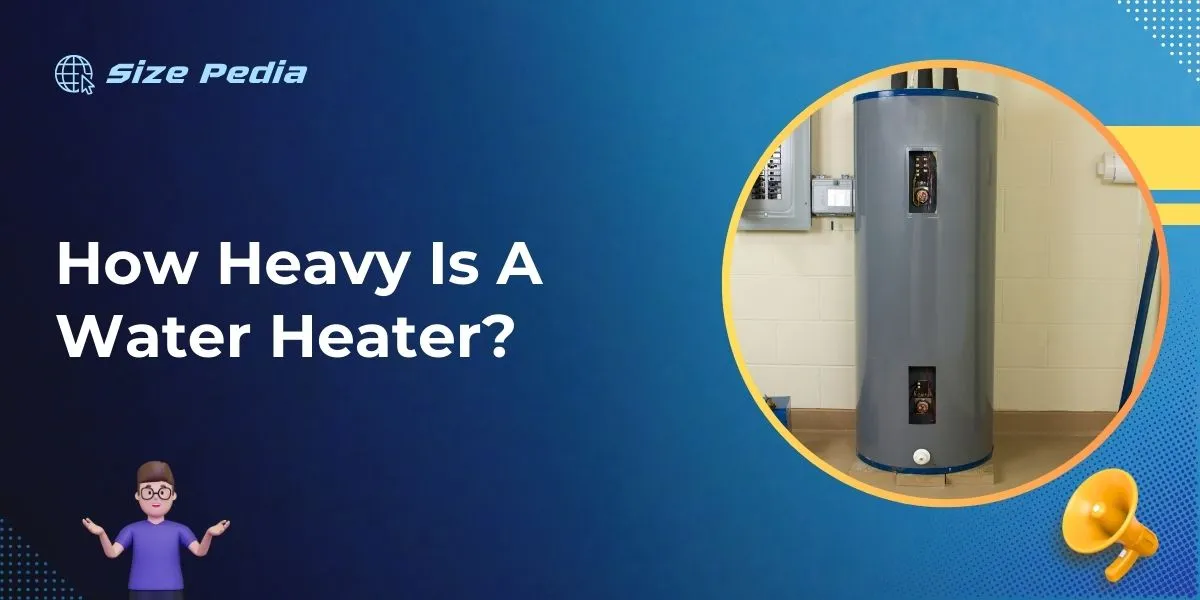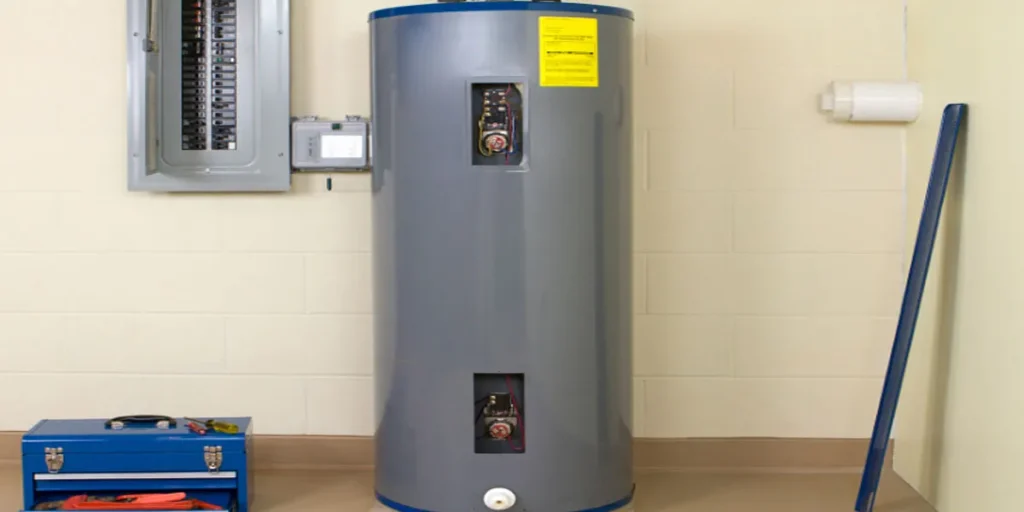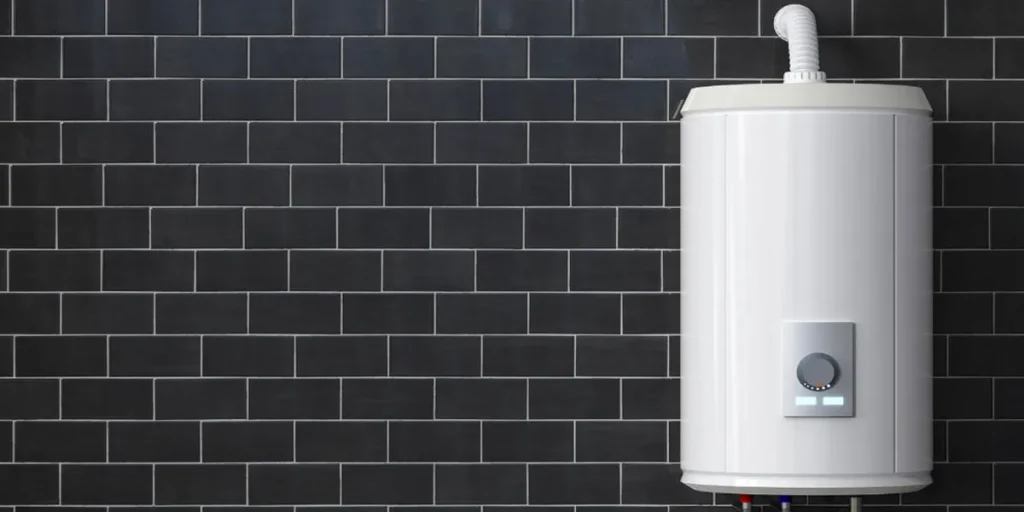A typical water heater weighs between 120 and 150 pounds when empty. Sizes and materials can cause this weight to vary.
Knowing the weight of a water heater is critical for both installation and safety considerations.
Whether you’re a homeowner preparing for an upgrade or a professional handling installations, an understanding of the unit’s weight aids in logistics and risk management.
Water heaters come in various types, including tankless, electric, and gas, each with distinct weights that impact handling and mounting requirements.
An empty standard 40-gallon water heater, one of the most common sizes, often weighs around 120 pounds, while larger 80-gallon tanks can weigh upwards of 150 pounds.
Factor in the additional weight of water, and a full tank’s weight increases significantly, necessitating sturdy support and careful transportation.
Proper installation ensures longevity and functionality, making knowledge of the weight an essential aspect of water heater management.

Weight Range Of Water Heaters
Understanding the weight of water heaters is vital. It affects installation, support structures, and shipping costs.
Different sizes and types have different weights. Let’s dive into what makes water heaters heavy.
Tank Vs. Tankless: Weight Disparities
Water heaters come in two main types: tank and tankless. The former stores water and is heavier. The latter heats water on demand and is lighter.
Materials also play a part in the weight.
- Tank water heaters: Capacity ranges from 20 to 80 gallons. They can weigh from 100 to 200+ pounds.
- Tankless water heaters: These are more compact. Weigh between 20 to 30 pounds on average.
| Type | Average Weight (pounds) |
|---|---|
| Tank | 100-200+ |
| Tankless | 20-30 |
Capacity’s Role In Weight
The water heater’s capacity is a big weight factor. More water means more weight. Let’s look at how capacity affects the heft of the unit.
- Small Capacity (30-40 gallons): Suitable for small homes. Weighs less, around 50 to 100 pounds.
- Medium Capacity (50 gallons): Ideal for medium-sized homes. Weighs in the range of 100 to 150 pounds.
- Large Capacity (75 gallons and up): Best for large homes or commercial use. Can weigh 200 pounds or more.
Material Matters: Composition’s Impact On Weight

Ever wondered why some water heaters weigh more than others? A water heater’s material plays a big role in its weight.
Standard In Water Heaters
Steel is the go-to material for most water heaters. Its durability and heat tolerance make it a wise choice.
Here’s what you should know about steel water heaters:
- Heavy: The robust nature of steel adds weight.
- Long-lasting: Steel units are built to last many years.
Steel tanks often come with insulation to keep water hot. This insulation adds more weight. A typical 40-gallon steel water heater can weigh around 120-150 pounds empty.
Alternative Materials: Lighter Options
Looking for something lighter? Consider these materials:
| Material | Weight Comparison | Benefits |
|---|---|---|
| Aluminum | Lighter than steel | Corrosion-resistant, good conductor |
| Fiberglass | Much lighter | Non-corrosive, good insulator |
These materials offer ease of installation and lower shipping costs due to their reduced weight.
Handling Water Heater Weight
A water heater, much like a mountain, stands tall and heavy in your home. It heats water to keep showers warm and dishes clean.
But, have you ever wondered about its weight? Like a small mountain, it can be quite the giant.
When the time comes to move or install a new one, knowing its heavyweight can be crucial. This section focuses on the tactics and tips to handle water heater weights safely.
Installation Intricacies: Preparing For The Weight
Installation of a water heater is not a solo task. It requires planning and strength. Before bringing the heater into place, it is imperative to understand its weight.
The size of the heater plays a significant role. A typical 40-gallon water heater can weigh between 120 to 150 pounds, whereas a larger 80-gallon tank might weigh up to 320 pounds empty.
Prepare the path. Clear any obstacles from the delivery area to the installation site. Measure doorways and turn angles to ensure the heater will pass through seamlessly.
Gather the tools. A dolly or hand truck and straps will make transportation safer and easier. Ensure they’re rated for the heater’s weight.
Here is a quick checklist to help you prepare:
- Verify water heater dimensions and weight
- Clear the path from obstacles
- Measure doors and stairways
- Ensure you have a dolly or hand truck
- Have straps or ropes on hand
- Recruit a helper or professional
Avoiding The Strain: Safe Lifting Techniques
Heavy lifting can cause injury if done improperly. Safe lifting techniques protect your back and limbs. When moving a water heater, your safety is paramount.
Bend the knees. When lifting, always bend at the knees, not the waist. This utilizes leg muscles and reduces back strain.
Keep it close. Hold the heater as close to your body as possible. This provides better control and decreases the risk of dropping it.
Move slowly. Rushing can lead to slips or awkward movements. Take your time to move in a controlled, deliberate manner.
Work in a team. Always have at least one person helping you. Communicate openly to coordinate movements and share the load evenly.
Use the right equipment. Leverage a dolly or lifting straps to distribute the weight more evenly and reduce the direct impact on your body.
Here’s how to stay safe while lifting:
- Start with bending your knees
- Keep the weight close to your body
- Move deliberately and without haste
- Communicate with your lifting partner
- Use appropriate tools for assistance
Understanding Water Weight

Water heaters come in various sizes. Each has its weight. But how much do they weigh with water inside?
Let’s dive in and understand the full impact of water on the total weight of a water heater.
The Filled Factor: Water’s Contribution To Total Weight
A water heater without water is like a balloon without air. Its true weight reveals itself when filled.
Water is heavy. A gallon of water weighs around 8.34 pounds. When you fill a water heater, this can add a lot.
For example, a 40-gallon tank adds over 330 pounds! Let’s break down these numbers.
- Empty tank weight: This varies by model and materials.
- Water volume capacity: Measured in gallons.
- Total weight: Empty weight plus weight of the water.
Gallons vs. Pounds: Calculating the Additional Heaviness
Gallons Vs. Pounds: Calculating The Additional Heaviness
Understanding the relationship between gallons and pounds shows true weight. Use this formula to calculate: Gallons x 8.34 = Pounds of water.
Add this to your empty tank weight, and you have your answer.
| Water Heater Capacity (Gallons) | Weight of Water (Pounds) |
|---|---|
| 40 gallons | 333.6 pounds |
| 50 gallons | 417 pounds |
| 75 gallons | 625.5 pounds |
Remember, the material of the heater adds to the total weight too.
FAQs About the Weight of a Water Heater
What’s The Weight Range For Water Heaters?
Water heaters typically vary in weight from about 120 to 200 pounds when empty. This depends on their capacity and construction materials.
How Does Tank Size Affect Water Heater Weight?
Larger tank sizes generally mean heavier water heaters. For instance, a 40-gallon tank may weigh around 120 pounds, while an 80-gallon tank can be over 150 pounds.
Are Tankless Water Heaters Lighter?
Yes, tankless water heaters are significantly lighter, usually weighing between 15 to 30 pounds due to their compact size and the absence of a storage tank.
Does Water Content Influence Heater Weight?
Absolutely. Water adds about 8. 34 pounds per gallon, meaning a full 50-gallon water heater can weigh an additional 417 pounds.
Conclusion
Understanding the weight of your water heater is crucial for safe installation and maintenance.
Average heaters weigh between 120 to 150 pounds when empty. Remember, capacity and materials can affect this.
Always consult a professional for heavy lifting to protect your home and health.
Ready for your next home improvement challenge? Keep these weighty facts in hand!
Resources:
https://www.gao.gov/water-quality-and-protection
https://www.usgs.gov/special-topics/water-science-school/science/facts-about-water
